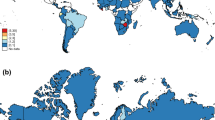Abstract
The study analyzed the effect of Political Stability (PS) and Economic Growth (GDP) on Tax and used Freedom of Corruption (FC) and Government Effectiveness (GE) as control variables. Study used unbalanced (includes 98 countries) as well as balanced (includes 57 countries) data for the period 2002–2008. Study found that all variables are non-normal. Further, it is found that PS affects tax in lower quantiles and somewhat higher quantiles but not in highest and intermediate quantiles. GE affects taxes in all quantiles but not in the highest level and value of the coefficient is also found to decreasing with the higher quantiles. Effect of GDP on tax is negative in all quantiles. Importantly, FC is found to be having negative effect at lower level of quantiles and positive at higher level of quantiles with increasing the coefficient value as quantiles increases.


Similar content being viewed by others
References
Aizenmana J, Jinjarak Y (2008) The collection efficiency of the value added tax: theory and international evidence. J Int Trade Econ Dev 17(3):391–410
Azevedo JPW (2004) Grqreg: stata module to graph the coefficients of a quantile regression. Boston College Department of Economics, USA
Azzimonti M (2010) Barriers to investment in polarized societies. MPRA paper no. 25936. http://mpra.ub.uni-muenchen.de/25936
Bohn F (2002) Public finance under political instability and debt conditionality. Economics Discussion Papers from University of Essex, Department of Economics, no. 540
Buchinsky M (1994) Changes in the U.S. wage structure 1963–1987: application of quantile regression. Econometrica 62:405–458
Buchinsky M (1998) Recent advances in quantile regression models: a practical guide for empirical research. J Human Resour 33(1):88–126
Coad A, Rao R (2006) Innovation and market value: a quantile regression analysis. Econ Bull 15(13):1–10
Cukierman A, Edwards S, Tabellini G (1992) Seigniorage and political instability. Am Econ Rev 82(3):537–555
Hao L, Naiman DQ (2007) Quantile regression. Quantitative applications in the social sciences. Sage, Thousand Oaks
Koenker R, Bassett G (1978) Regression quantiles. Econometrica 46:33–50
Koenker R, Hallock KF (2001) Quantile regression. J Econ Perspect 15:143–156
Melo M (2011) Institutional weakness and the puzzle of Argentina’s low taxation. Latin Am Politics Soc 49(4):115–148
Mosteller F, Tukey J (1977) Data analysis and regression. Addison-Wesley, Reading
Rieth M (2011) Essays on dynamic macroeconomics: Debt, taxation, and policy Interaction. Dissertation zur Erlangung des akademischen Grades, Doktor rerum politicarum der Technischen Universität Dortmund
Volkerink B, De Haan J (1999) Political and institutional determinants of the tax mix: An empirical investigation for OECD countries. Research Report, from University of Groningen, Research Institute SOM (Systems, Organisations and Management), No. 99E05
Author information
Authors and Affiliations
Corresponding author
About this article
Cite this article
Tiwari, A.K. Taxation, Economic Growth and Political Stability. Transit Stud Rev 20, 49–61 (2013). https://doi.org/10.1007/s11300-013-0264-8
Published:
Issue Date:
DOI: https://doi.org/10.1007/s11300-013-0264-8




